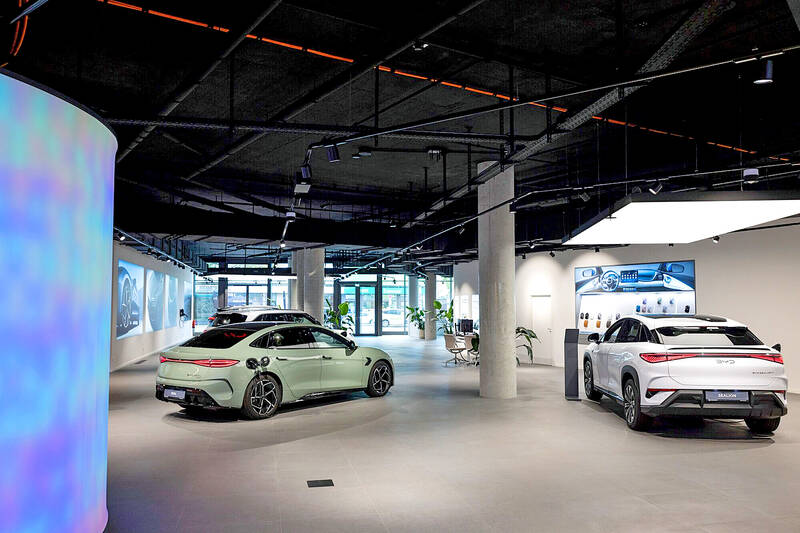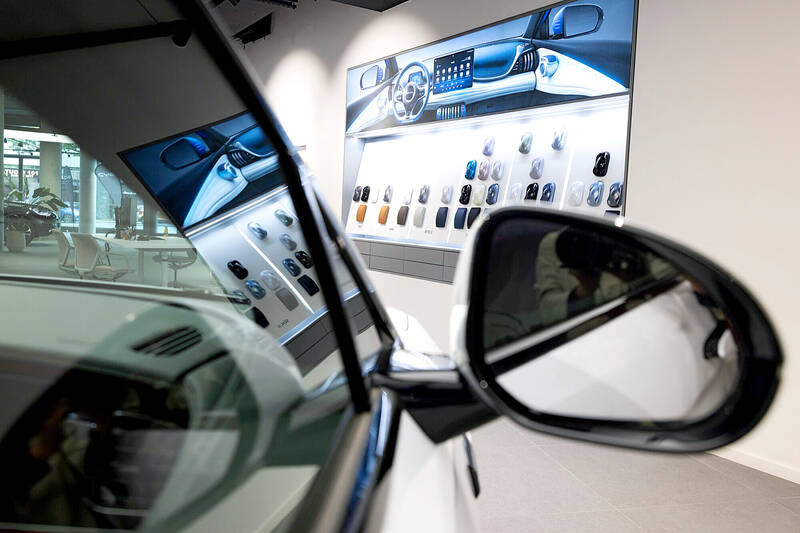Checking out an electric vehicle (EV) made by China’s BYD at the IAA Mobility car show in Munich, Germany, German designer Tayo Osobu was impressed by the interior and said she would consider buying one.
“And why not?” asked the 59-year-old from Frankfurt, Germany, in a country where domestic titans Volkswagen, BMW and Mercedes-Benz have long dominated.
“If they are sold here, it means they meet European standards,” she said.

Photo: Bloomberg
At the auto fair last week, Chinese EV makers were out in force, highlighting the determination of the country’s fast-growing car giants to make inroads into Europe.
About 100 Chinese auto companies flocked to Munich, out of a total 700 exhibitors at the show hosted once every two years, ranging from big-name manufacturers to smaller suppliers and start-ups.
While they still lag far behind Europe’s long-established carmakers in terms of market share on the continent, firms from the world’s No. 2 economy have been gaining ground with their technology-packed EVs.

Photo: Bloomberg
Leading the pack is giant BYD, whose sales in Europe surged by 250 percent in the first half of the year. In Munich, the manufacturer was showcasing flagship models such as the Dolphin Surf, a small EV with a starting price of about 20,000 euros (US$23,463) — cheaper than many offerings from European carmakers.
Volkswagen, Europe’s biggest automaker, in contrast has seen sales and profits fall in the face of fierce competition and weak demand, prompting it to announce plans for mass layoffs in Germany. US EV pioneer Tesla, which was not present at the show in Munich, has also seen its market share drop — in part because many consumers have been put off by its boss Elon Musk’s support for far-right political parties.
Chinese carmakers have grown rapidly as they have benefited from lower labor costs, generous government support and strong consumer demand for their high-tech models in the world’s biggest auto market, experts said.
“What has changed in five years is that, at a lower price, the Chinese are now on par in terms of technology and quality in many respects,” said Stefan Bratzel, director of the Center of Automotive Management in Germany.
To combat the influx of Chinese cars and protect European manufacturers, the EU last year slapped hefty new tariffs on Chinese-made EVs over what the bloc said were unfair state subsidies.
However, sales of Chinese electric cars have continued to grow, and BYD looks set to skirt the levies — its first European factory, in Hungary, would start production later this year.
However, Bratzel said it was “too early” to talk about an invasion.
Chinese carmakers still need to establish “a relationship of trust” with European consumers, and build up networks of dealerships and after-sales services, he said.
There was skepticism about Chinese cars among some of those attending the Munich fair.
“If you drive a Chinese car, which garage would you go to if there are problems?” said Pamina Lohrmann, a 22-year-old German woman, at the Volkswagen stand where an old model of the popular Polo was on display.
“I grew up with German brands, they appeal to me more,” Lohrmann said.
Despite such concerns, some Chinese carmakers, such as Xpeng, are hoping to attract a tech-savvy, younger demographic.
XPeng president Brian Gu said the manufacturer was aiming for “the first wave of tech enthusiasts.”
Europe’s storied carmakers are fighting back, hoping their trustworthy reputations, built over many decades, would stand them in good stead.
Among a series of more affordable EVs unveiled by Volkswagen in Munich last week was one named “ID.Polo,” aiming to capitalize on the popularity of its classic small car.
European carmakers are also adopting new battery technology and looking at using more Chinese components in their vehicles, industry expert Matthias Schmidt said.
They aim to focus on their “heritage, legacy and DNA,” Schmidt said, adding that these are characteristics that “Chinese new market entrants simply don’t have.”

Sweeping policy changes under US Secretary of Health and Human Services Robert F. Kennedy Jr are having a chilling effect on vaccine makers as anti-vaccine rhetoric has turned into concrete changes in inoculation schedules and recommendations, investors and executives said. The administration of US President Donald Trump has in the past year upended vaccine recommendations, with the country last month ending its longstanding guidance that all children receive inoculations against flu, hepatitis A and other diseases. The unprecedented changes have led to diminished vaccine usage, hurt the investment case for some biotechs, and created a drag that would likely dent revenues and

Macronix International Co (旺宏), the world’s biggest NOR flash memory supplier, yesterday said it would spend NT$22 billion (US$699.1 million) on capacity expansion this year to increase its production of mid-to-low-density memory chips as the world’s major memorychip suppliers are phasing out the market. The company said its planned capital expenditures are about 11 times higher than the NT$1.8 billion it spent on new facilities and equipment last year. A majority of this year’s outlay would be allocated to step up capacity of multi-level cell (MLC) NAND flash memory chips, which are used in embedded multimedia cards (eMMC), a managed

CULPRITS: Factors that affected the slip included falling global crude oil prices, wait-and-see consumer attitudes due to US tariffs and a different Lunar New Year holiday schedule Taiwan’s retail sales ended a nine-year growth streak last year, slipping 0.2 percent from a year earlier as uncertainty over US tariff policies affected demand for durable goods, data released on Friday by the Ministry of Economic Affairs showed. Last year’s retail sales totaled NT$4.84 trillion (US$153.27 billion), down about NT$9.5 billion, or 0.2 percent, from 2024. Despite the decline, the figure was still the second-highest annual sales total on record. Ministry statistics department deputy head Chen Yu-fang (陳玉芳) said sales of cars, motorcycles and related products, which accounted for 17.4 percent of total retail rales last year, fell NT$68.1 billion, or

In the wake of strong global demand for AI applications, Taiwan’s export-oriented economy accelerated with the composite index of economic indicators flashing the first “red” light in December for one year, indicating the economy is in booming mode, the National Development Council (NDC) said yesterday. Moreover, the index of leading indicators, which gauges the potential state of the economy over the next six months, also moved higher in December amid growing optimism over the outlook, the NDC said. In December, the index of economic indicators rose one point from a month earlier to 38, at the lower end of the “red” light.